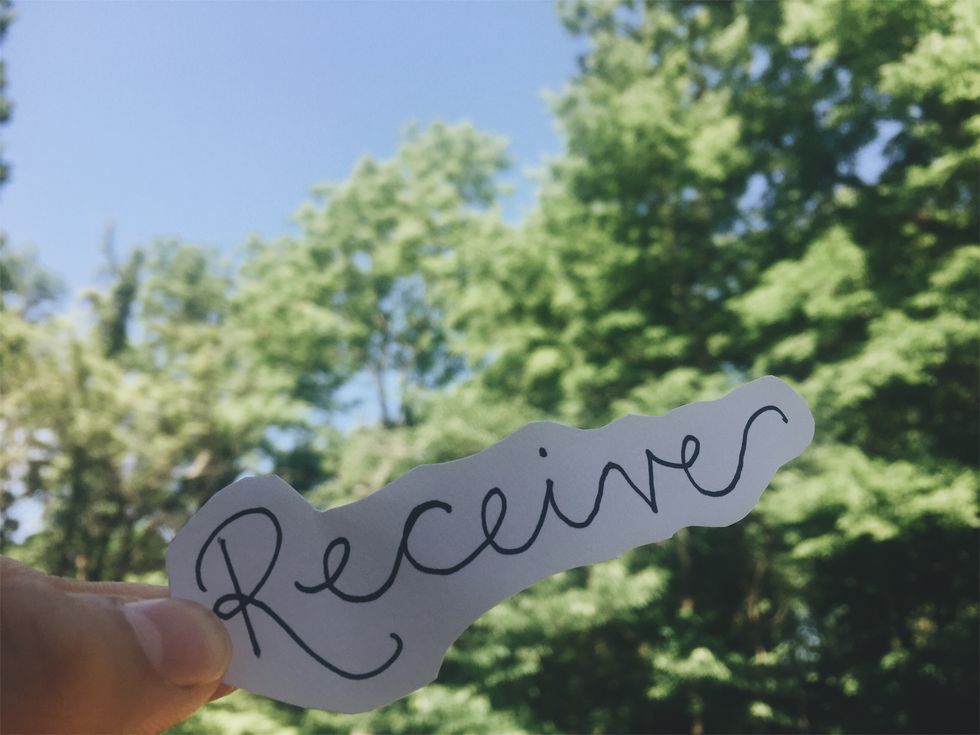A few weeks ago, I wrote an article about the importance of showing love. I think, in our world of complicated advice and complex emotions, "show love" is just a simple, vital little phrase to keep in our minds. But with showing and giving love to others, there is also another, oftentimes more challenging side of things. I think this is the part that is harder, especially after learning our whole life the importance of putting others before ourselves. To give love, I think that one must also be able to receive love.
Receiving love means letting someone buy you a coffee and not forcing them to take your money. It means hearing a compliment and truly believing it, not rebuking it or feeling the need to say one back. It means saying "thank you" and earnestly, genuinely meaning it enough that you don't need to say anything else. It means recognizing that you are worth someone else's love.
In his book "Blue Like Jazz," Don Miller talks about how much he struggled with this concept of receiving love. He talks about the time when he was in a relationship with a girl who would express her love to him, but he just couldn't quite believe it; he refused to receive it.
"Then she did it; she decided we didn't need to be in touch anymore. She broke it off. She sent me a letter saying that I didn't love myself and could not receive love from her" (Miller 230).
Reading this - that not loving yourself means not being able to receive love - struck me hard. It just hit me how much sense it makes: if you can't see your own worth, it's because you don't want to. Therefore when someone else points it out it's not going to become anymore clear to you if you already have it in your mind that you're worthless. I think Miller puts in beautifully when he vulnerably admits that he did not love himself, therefore he could not be fully loved by this girl.
He continues with the story, "And then this sentiment occurred. It was simple: Love your neighbor as yourself. And I thought about that for a second and wondered why God would put that phrase so strongly in my mind...He was saying I would never talk to my neighbor the way I talk to myself, and that somehow I had come to believe it was wrong to kick other people around but it was okay to do it to myself" (231).
I love that Miller brought this up. I can't even count the number of times I've heard the verse "Love your neighbor as yourself," and for some reason, I always hear it solely as a reminder to love others well. It seems like a phrase we say to try and humble ourselves, remind us to treat others good. But I think we often forget that in treating our neighbors as ourselves, that means we also have to love ourselves well. The phrase is not "love your neighbor way more than yourself," it's about equality. I think God wants us to love ourselves, to recognize that we are worthy of love, just as much as he wants us to love others.
So it's a two way street - "If it wrong for me to receive love, then it is also wrong for me to give it because by giving it I am causing somebody else to receive it, which I had pre-supposed was the wrong thing to do" (231).
We have become accustomed to believe that giving our all to others is the most important thing to do, but we are not able to do that without also being able to take the stance of the receiver at times.
This concept of receiving love is something I've really been trying to remember lately. Because how can I have a relationship my friends, my family, God, without loving them AND receiving their love? We've all heard the phrase "We accept the love we think we deserve" - and I think it's so accurate. God has no limit to his grace and people will love and help you way more than you will think, you just have to accept it and believe that your worth it.
"And so I have come to understand that strength, inner strength, comes from receiving love as much as it comes from giving it" (232).
Miller, Donald. Blue Like Jazz: Nonreligious Thoughts on Christian Spirituality. Nashville: Thomas Nelson, 2012. Print.



















